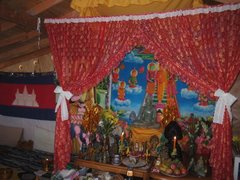Cambodian New Year is a national celebration that conveys the value and meaning of our tradition, religion and daily living of Cambodian people. This year is the year of pig, Noppeak Sak, BE.2551.
Allow me to briefly describe the cultural meaning of this annual festival:
1. A belief that good things occurred in transitioning from the old year to the New Year – this is a universal belief that exists with many people throughout the world. Cambodian people call this festival Song-kran which means “moving”. The festival takes place over three days and is name accordingly: first day is called “Song-Kran”, second day called “Vanabot” and third day called “Lerng Sak”. Cambodian people believe that the last day, Lerng Sak, is when all life activities must be made new (e.g., new thought, new progress and new harmony) – to aspire to always be better than the past years.
2. Cambodian people believe that 7 angels take turns caring for their Kabila Phrom’s head when he was beheaded because he lost an intellectual competition with a simple human man named Dhammapala. The meaning behind this story teaches children that the gratitude towards one’s parents is critical to bringing happiness to them. There is a deeper level of meaning to this story as well. The Kabila Phrom is magical and miraculous as it relates to to the four sublime states of the mind: compassion, loving-kindness, sympathetic-joy and equanimity.
3. Cambodian people enjoy the traditional activities such as Sand Mount, washing the Buddha Statue that is symbolic to asking forgiveness, paying gratitude, cleansing all bad actions and sin. In performing this action, they also promise not to do such evil deeds again in the coming New Year. They promise they will only do good deeds.
4. Cambodian people also clean their home and decorate it with flowers, lanterns and glittering lights to welcome new angels whom they believe will bring happiness and prosperity to them.
5. Cambodian people of all ages, young and old, are also play traditional games such as Choul Chhoung, Boh Angkuh and Tienh Proat, etc
On New Year’s Day, Buddhist perform the follwoing:
1. On the first day, they go to the nearby temple to gain merit and observe five moral precepts, offer Dana, give alms, chant and the bless their ancestors through prayer and meditation. They also participate in the celebration of the final day at the temples.
2. They will ask forgiveness from their parents – for all intentional and unintentional actions, and also offer gifts to their parents.
3. They create Sand Mount to dedicate to the Buddha relic in Chulamuni stupa to cleanse all of their sin. They will wash the Buddha Statue in order to wash away their impure thoughts in order to pursue higher happiness and peace.
4. They invite Buddhist monks to their home to perform chants and mantra and deliver Dhamma or preaching for happiness and prosperity to the family during the new coming year.
5. Some people go to the temple to practice and meditate all day. They dress in white clothes, observe the eight moral precepts and practice meditation at least three full days.
The practice involving daily life of Cambodian people
Since the ancient times, Cambodia has always been an agricultural country. Most Cambodian people are peasants. The New Year Festival was always held in April, the dry season in Cambodia so that the peasants can relax from their hard working on the farm.
1. It is a time that is free time from the labor of farming, so they have plenty of time to celebrate this very joyous festival. They can also cool themselves from the heat typically found in Cambodia during the month of April.
2. It is the chance of family reunion and gathering especially among young girls and boys who can socialize with each others during this auspicious festival.
3. It is the time to play traditional games such as Choul Chhoung, Boh Angkouh, Leak Konsaeng, Teanh Proat and enjoy traditional popular dances.
4. It is a time for them worship at the temple.
5. It is an opportunity to gain merits and do good deeds such as observing the moral precepts, makie offerings and meditate and attend the monks’ preaching and chanting mantras.
In closing, I would like to thank you very much the committees of Cambodian Community Association and all participants in here today. I especially want to thank the Cambodian community association, Cambodian Buddhist Association, Cambodian Students Association, brothers, sisters and all distinguished guests who are in here and who helped to make our celebration this year more festive and joyful.
I would like to emphasize that our place here is not yet ready. In order to build a real permanent temple (Cambodian Buddhist Cultural Center), we need your continued support. The success that you see here today does not belonged to any single individual person, but it is the success and pride of everybody. We need your commitment to realize a permanent temple (a Cambodian Buddhist Cultural Center).
I wish you all health, wealth, prosperity and happiness in this new coming New Year, the Year of the Pig, 2551. May you all have happiness, peace and prosperity throughout the New Year.
Thank you very much

No comments:
Post a Comment